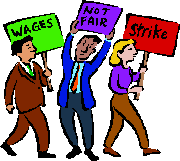The United Steelworkers union (USW) made history with its 2008 convention just held in Las Vegas. That’s History with a capital “H.” The kind of history that can forever change labor and our country. The kind of history that was made in 1935 when the CIO - Committee for Industrial Organization was formed.
The establishment of the CIO was neither the beginning, nor the end of the struggle for industrial unionism in the US and Canada. But it did mark an historic organizational turning point for labor. By its founding the CIO moved beyond the general question to the particular struggle to organize workers on an industrial basis. This advance by labor was crucial to match the development of monopoly capitalism.
Even long before 1935 there was a strong left/center core of unions and union leaders who fully understood that craft unionism could not match the power of giant corporations with factories all over the country, and even the world. They also saw that local unions with only local contracts would have little leverage in dealing with giant monopolies that could shift production and force workers to compete across state lines. Inherent to industrial unionism was the idea that all workers in a company and in a workplace should be organized in the same union with the same master contract. Also inherent in the thinking behind industrial unionism was the idea that unions had to fully participate in political struggles in addition to the direct economic struggles of workers.
Remember the name “Workers Uniting.”
It may very well be the CIO of our time. On July 2, the Steelworkers, the largest industrial union in the US and Canada, and, Unite the Union, the largest industrial union in the United Kingdom and Ireland, signed an agreement clearing the way for the creation of Workers Uniting. This will be the world's first global union.
There can be no doubt that the new union sees its mission as broad and transformative.
"Globalization has given financiers license to exploit workers in developing countries at the expense of our members in the developed world. This new union is crucial for challenging the growing power of global capital," said USW President Leo W. Gerard to loud applause from the over 3200 delegates.
Workers Uniting, in its constitution, calls on its members to "build global union activism, recognizing that uniting as workers across international boundaries is the only way to challenge the injustices of globalization.”
It is also clear that this merger is only the beginning. Workers Uniting is in talks with other unions around the world. It plans to very quickly open offices in Central America, the Middle East, Asia, Eastern Europe, Africa and other regions. The USW convention featured international delegations from 29 countries.
The new global union makes clear that they will go beyond ‘pure and simple trade unionism. Rather they will be championing international working class solidarity, economically, politically and socially on a global scale. For example the USW and Unite the Union, even before the merger, have been collaborating on worker justice and solidarity efforts in Colombia where more trade unionists are murdered every year than anywhere else in the world. The convention saw a powerful video featuring the unions combined efforts to bring economic and social justice to rubber workers in Liberia, Africa.
The formation of the CIO did not take place in a political or economic vacuum. Nor did its success. It was a perfect storm. The CIO was born in response to a new level of corporate attacks on working families and labor. It grew out of a failing capitalist economy. It grew out of intense legislative and political action by the CIO unions. And it grew in tandem with broad social movements of the day, movements that challenged racism and discrimination against women, that promoted independent political action, movements for unemployment compensation and social security.
Sound familiar? The USW convention reflected much the same kind of perfect storm. All of this was totally entwined with the possibilities of change represented by the Barack Obama campaign. Richard Trumka, secretary-treasurer of the AFL-CIO, called on labor to lead the fight against the “evil of racism” to elect Obama. The convention rang with calls from the rank and file delegates and the leadership for national health care, economic justice, passage of the Employee Free Choice Act and the right to organize, ending the war in Iraq, preserving Social Security and pension, defending civil liberties, and on and on. All reflecting activism and involvement in the broader social movements of the day.
In his comments to the USW convention, AFL-CIO president John Sweeney recognized the moment when he said, “Your alliances with world federations and unions in Australia, Brazil, Germany and Mexico have provided us with a blueprint for worldwide solidarity, and your merger with UNITE the Union makes a mockery of the empty rhetoric of so many other organizations that give lip-service to global solidarity and global unionism — but do nothing to advance it.”
The founding of Workers Uniting is not the beginning or the end of “Workers of the World Unite.” But it is a remarkable turning point in the right direction. History has been made and global labor power is in the making.


No comments:
Post a Comment